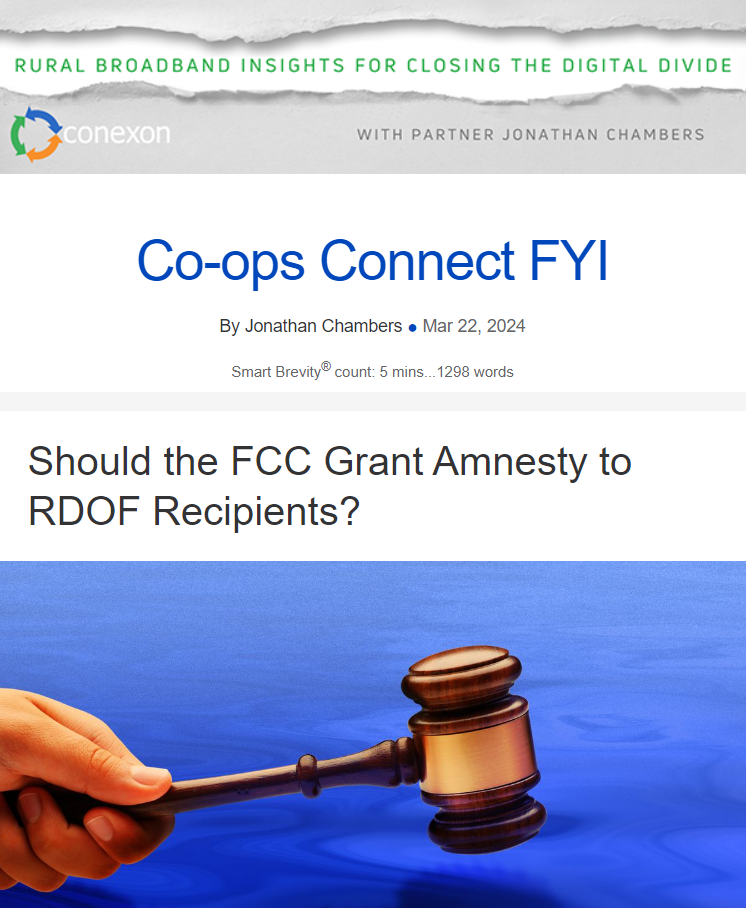Should the FCC Grant Amnesty to RDOF Recipients?
March 22, 2024
Two weeks ago, the FCC sought comment on a letter filed by a coalition of counties, public interest groups, and internet service providers that supported a petition proposing limited amnesty for RDOF recipients if they return their RDOF awards.
- In other words, a winning bidder in the RDOF auction could relinquish the funding and the buildout obligation with no or minimal penalty.
See the FCC’s request for comment here.
The reason for the amnesty petition?
BEAD rules prohibit the award of funds to areas where there is broadband service or where there is an existing provider with a state or federal obligation to provide broadband service.
- Since the majority of RDOF funding did not begin until 2022 and the buildout milestones run through 2030, there is an inconvenient timing issue.
- Should an RDOF recipient default on its obligations in the next several years, the FCC will recover funds and assess penalties.
- In that case, the FCC will have protected the public fisc, but it will be too late to get BEAD funds for those areas.
- Recovery of RDOF funds in several years will be small comfort to those communities still lacking broadband and missing out on BEAD.
You can read the full petition here.
What happens with a petition to the FCC?
The FCC is under no obligation to act on any petition.
But, by putting this proposal out for public comment, with expedited consideration, the FCC is signaling that it takes this proposal seriously.
What comes next?
- Public comments are due next week.
- Replies to the public comments are due two weeks after that.
- Once the FCC has received the reply comments, it will have a record on which it can act at any time.
- To meaningfully affect the BEAD process, the FCC could write rules by April or May and give RDOF recipients 30 to 60 days to make use of the proposed amnesty.
A prior amnesty:
The FCC ran an RDOF amnesty once before in 2021, when it allowed RDOF recipients to return winning bids if they found geographic areas that had been part of the RDOF auction but were already served.
- That amnesty was styled as a good government data clean-up.
- While many RDOF recipients returned winning bids at that time, Conexon did not.
My Point of View
I don’t plan to file comments with the FCC in this proceeding. I will share my views here.
For more than 30 years, I have been engaged in FCC auctions.
- In 1993, when I was the Republican staff director of the Senate Commerce Committee, our staff drafted legislation that gave the FCC its first auction authority.
- In 1995, I was the representative for the largest winning bidder in the early FCC spectrum auctions.
- While at the FCC between 2012 and 2016, I helped design several of the initial Universal Service auctions, whose guidelines ultimately became the rules for the CAF II and RDOF auctions.
- During consideration of the RDOF rules, the FCC adopted my proposal for an auction design: a waterfall auction, where the bidder for the highest speed tier wins over all other bidders.
- In 2018 and again in 2020, Conexon organized the largest bidding consortium in FCC history – the Rural Electric Cooperative Consortium – which won more funds than any other bidder in the CAF II and RDOF auctions.
In addition to participating in FCC auctions for decades, I have also spent hundreds of hours in my career discussing and debating auction design, auction rules, and the consequences of various choices by the FCC in administering auctions.
My opinion:
I think the FCC should grant the petition for limited amnesty.
Go Deeper
Most arguments against the FCC taking this action are related to maintaining the integrity of FCC auction results.
- That is, bidding behavior will be affected if future bidders believe the FCC might grant future amnesties.
- In addition, anyone outbid in the RDOF auction, as we were in many geographic areas, may feel some bitterness toward those who receive amnesty. Allowing the winning bidder to default with minimal penalty may feel unfair to those who were outbid.
I understand there are those who were outbid in the RDOF auction who want some retribution.
- I have heard from co-ops who think some companies acted in bad faith by bidding down the prices in the auction to block competition.
- To those co-ops, I’d suggest that they are better off now if the RDOF winner returns the award so that the geographic area can become part of the BEAD program.
RDOF shortcomings:
RDOF was a well-designed but ineptly administered auction.
Most notably, the FCC did not adequately vet technologies or bidders.
- The FCC was briefed on each satellite and wireless technology before the auction, but only made critical decisions on eligible technologies after the auction.
- For example, the FCC allowed SpaceX, which outbid others throughout the country, to bid. During the post-auction review, however, the FCC disqualified SpaceX for the technology it was using.
- Other disqualifications, such as the default of LTD, the largest “winning” bidder, also occurred after the auction. LTD’s limitations should have been abundantly clear before allowing them to bid.
- To add insult to the injury of losing to a disqualified bidder, there also were no “next in line” awards to replace disqualified bidders with qualified ones.
Those geographic areas left unserved by disqualifications were intended to be placed in an RDOF II auction —but that auction did not and will never happen.
By the numbers:
- Of the $20 billion designated for RDOF, only $5-6 billion will be spent by the end of a decade.
- While the FCC announced the RDOF results and published maps with great fanfare at the end of 2020, it did not begin awarding funds until the close of 2021 and throughout 2022.
- The funds are awarded over 10 years, with buildout milestones at years 3, 4, 5, 6, and 8.
- Since 2020, communities have anticipated that RDOF funds would quickly produce broadband service.
- Yet, the FCC’s schedule was for most service to be rolled out between 2024 and 2030.
For many communities, the RDOF schedule has been both slow and uncertain.
The Path Forward
I do want to note the significant successes of some RDOF recipients.
- Since RDOF funding began, we have assisted our co-op partners in building 80,000-100,000 miles of rural fiber networks, passing hundreds of thousands of previously unserved rural homes and businesses.
- Yet, even at that pace of construction and with our track record, more than one community has asked us to give up our RDOF award so they can apply for BEAD funding.
RDOF and BEAD don’t work together well as a matter of geography. I’ve been looking at unserved maps for years. At Conexon, we have mapped every census block in the country for the possibility of building a fiber network.
I’ve come to one inescapable conclusion. To be successful, the BEAD program needs RDOF areas to be included.
- Where there is an RDOF award, the remaining eligible BEAD areas are in sparsely populated, disconnected census blocks. BEAD applicants won’t be able to design, build and operate a sustainable network with BEAD funds alone.
- Where there has been an RDOF default, however, BEAD will work.
Which brings me to my main reason for supporting limited amnesty.
I have advocated for broadband self-determination by communities for over a decade, at the FCC and at Conexon.
- For Conexon, electric co-ops are the community. We’ve worked to build fiber networks with over 80 co-op communities.
- If a community wants to take its chances with BEAD instead of with a company that has an RDOF commitment, I believe they should have that opportunity.
Granting the amnesty petition now will improve the prospects for more co-ops to build more fiber networks.

